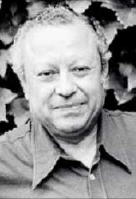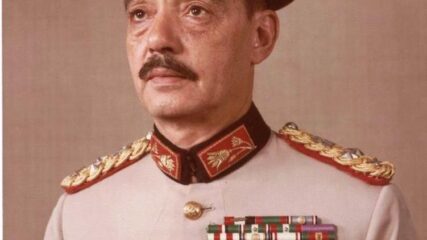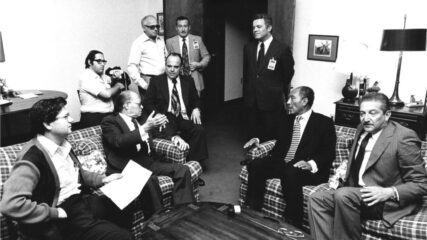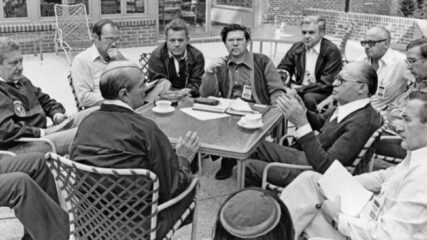Transcripts of interviews with history makers and witnesses

July 16, 1992 Ken Stein Interview with Ambassador Roy Atherton, Washington, D.C., July 16, 1992 Alfred Roy Atherton Jr. participated in U.S-Soviet Middle East negotiations and formulation of the Rogers Plan, 1969; Kissinger-Ismail secret meeting…

Tahsin Bashir served as spokesman for Egypt and for the Arab League in many capacities from 1963 to 1978. He knew Anwar Sadat intimately, revealing that Sadat kept his own counsel while using others to test political and diplomatic options. His long-term goal was to reorient Egypt away from Moscow and obtain Sinai’s return. Sadat cleverly managed others, including Kissinger, Carter and his own advisers.

Hermann Eilts played a pivotal role in representing the U.S. to Egypt and vice versa in the vital 1973-1980 period when Egypt embraced Washington and turned away from Moscow, and made peace with Israel. Eilts knew Egyptian President Sadat as well as any American official in the period. He provides rich detail and vivid insights into Sadat’s often mercurial decision-making.

General Ghani el-Gamasy served as Egypt’s chief of staff during the October 1973 war, executed Egypt’s limited success across the Suez Canal, and negotiated with an Israeli counterpart, General Aharon Yariv, the details of the Kissinger-choreographed Kilometer 101 talks, which led to the January 1974 Egyptian-Israeli Disengagement Agreement. Gamasy was surprised when Sadat told him at Aswan then, “Egypt was making peace with the United States and not with Israel.” Gamasy to Yariv, “We (the Egyptians) are finished with the Palestinians.”

Ashraf Ghorbal represented Egypt to the US for four years from 1968 to 1972 until Egypt restored diplomatic relations with the US in the wake of the October War. Ghorbal was Sadat’s Ambassador in Washington for 11 years until 1984. He credits Sadat with foresight in setting out and fulfilling his diplomatic objectives; breaking from the USSR, aligning Cairo with the US, harnessing US diplomacy under Kissinger and Carter to secure Sinai’s return to Egyptian sovereignty, and even if that meant signing agreements and recognizing Israel.

Hafez Ismail was a close adviser to Egyptian President Anwar Sadat. Ismail carried out secret negotiations with Henry Kissinger before the 1973 war to see if the U.S. would quietly start talks with the Israelis. Kissinger said no. Ismail provides notable insights into Sadat’s sophisticated decision-making.

June 10, 1992 (Permission to publish this interview granted by Peter Rodman, June 1992) Peter Rodman, member of United States National Security Council Staff and Special Assistant to Henry Kissinger and Brent Scowcroft, August 1969…

Omar Sirry provides intimate details of the diplomatic aftermath of the October 1973 War, the Kilometer 101 talks, Kissinger’s choreography of the December 1973 Middle East peace conference, and admiration for Sadat as the “modern Egyptian Pharaoh” who was not ever politically passive but took repeated initiatives for Egypt’s benefit.

In the 1970s, US State Department Ambassador Michael Sterner was privy to Sadat’s preference for step-by-step diplomacy PRIOR to the 1973 October War. He is critical of the Carter administration for being too satisfied with only a bilateral Egyptian-Israeli Agreement.

Tamir was a 35-year veteran of the Israeli army, attending all Egyptian-Israeli negotiations as a strategic planner. He stated that he thought the 1973 war could have been averted if Golda Meir had responded to Sadat’s pre-war overtures. He credits Henry Kissinger’s negotiating successes of the post-1973-war period as laying the basis for the successful 1978 and 1979 Egyptian-Israeli agreements.







